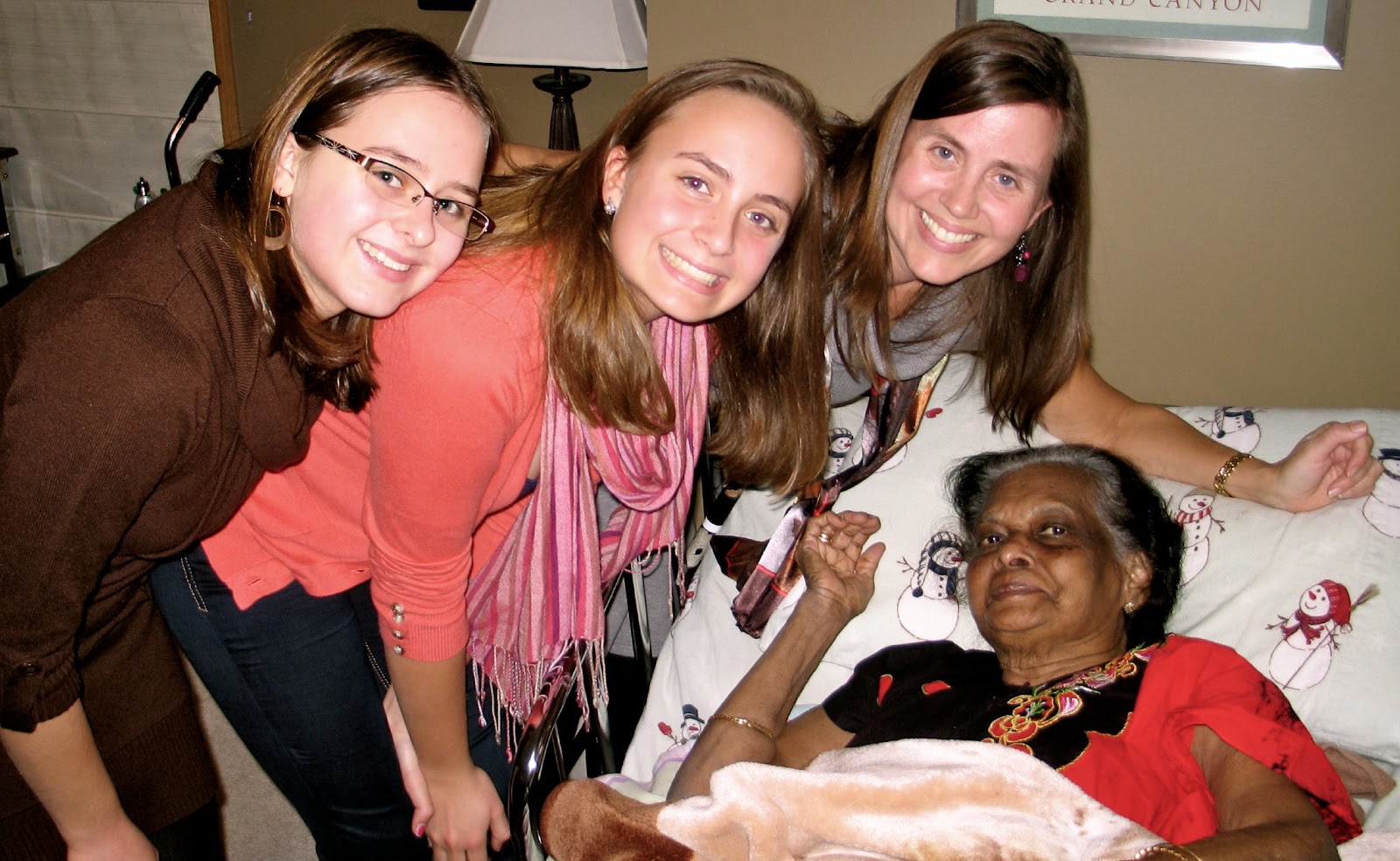Mar 17, 2014 | Assisted Living, Dying, Grandma, Praying, Uncategorized
One of the last times I visited my Grandmother at the Care Center where she lived, staff members wheeled her hall-mate out on a gurney.
“We all come here to die,” my Grandmother said matter-of-factly after her sheet-covered neighbor passed from view.
She was right: residents in her wing of the Care Center weren’t waiting to get better or younger or to move somewhere else. This building was their last stop in this life. She and her neighbors had come there to die.
Words failed me at that moment, as they often do when we come face-to-face with the limits of our existence. I held her hand as her words about death lingered in the space between us. The conversation gradually picked up again and we talked about goings on of various members of our extended family. Invariably Grandma’s information was more up-to-date than mine on cousins and great aunts and family friends. Even as the world she inhabited narrowed, her sharp mind and wit enabled strong connections to a much wider world beyond her tiny room. It was true that she longed for death. But even as the end drew very near, Grandma died like she was living.
(more…)
Feb 13, 2014 | Beckett, Samuel, Breast Cancer, Dying, Grace, Kalanithi, Paul, Live Like We're Dying, Uncategorized
When I was diagnosed with stage IV cancer, I started preparing to die. Granted, we should all “live like we’re dying” as singer Kris Allen reminds us, but an aggressive diagnosis ups the urgency on doing just that. I went back to teaching even though I could barely stand up because I wanted to be in the classroom one last time. I stopped buying new clothes because I didn’t think I’d have much time to wear them. I insisted on a summer vacation even though my stamina was shaky because I thought that would be the last one I’d take with the family. My husband and I secured burial plots. There didn’t seem to be much time, and I was intentional in my preparations for the end.
Then I went into remission. Having already resigned from my life, I gradually let myself believe that there could be another semester in the classroom, that if I bought new clothes I’d have some time to wear them, that I might get to experience another family vacation. What an amazing turn of events. Thank God, thank the doctors, thank the world for allowing me more time.
(more…)
Jul 1, 2013 | Amma, Dying, Funeral, Peterson, Linnea, Uncategorized

Last summer, when Amma was diagnosed with advanced stage lung cancer, my elder daughter wrote this tribute:
First there were butterfly crackers and squares of cheese at the kitchen table. Amma spoke Tamil and I didn’t understand, but I knew she got out the crackers and that she cut the squares of cheddar for me. I liked adults who did this. I was four, and I liked Amma.
Next there were nightgowns at Christmas – beautiful and lacy – fresh off Amma’s sewing machine. “Thank you,” I said when my parents nudged me, and I hugged her, feeling her stiff, silky sari under my little hands. It was so unlike what my mother and aunts wore, but it felt right on her, because she was Amma.
Later, there were dresses and stockings, sewn and knitted, even as I started to notice Amma’s bony brown hands and wondered, Should they still be sewing?
(more…)
Aug 17, 2012 | Alzheimers, Dying, Faith, Genova, Lisa, Grace, Hope, Still Alice, Uncategorized, Vulnerability
This summer my aunt sent me a copy of Lisa Genova’s Still Alice, a novel about a 50-year-old Harvard professor diagnosed with early onset Alzheimer’s. Scanning the back cover my eyes rested on the phrases “searing spotlight” and “dread disease,” tempting me to set the book on the bookshelf unread. My own dread disease of stage IV cancer already dominates much of the landscape in my life—why devote precious summer hours to another tale of grief? Breezy novels about beaches and sunsets seemed a more attractive option.
But the book was a gift, so I decided to give it a few pages. It didn’t take long to be drawn in to Genova’s chronicling of the cracks in Alice’s wonderful life. A thriving professional woman at the height of her career, Alice’s life was rich with things we in academia covet: smart students, speaking engagements in lovely locales, always-engaging campus environment. Amidst the loveliness of her life, the forgetting begins slowly, almost undetectably, building to a silent roar that only Alice can hear. She initially hides her diagnosis from everyone in her life, hoping that if she doesn’t say the words “early onset Alzheimer’s” out loud she can prevent the disease from taking control. But take control it does, and the rest of this first-person narrative walks the reader down the treacherous path that Alice must take as her life becomes increasingly dictated by the disease.
(more…)


You must be logged in to post a comment.